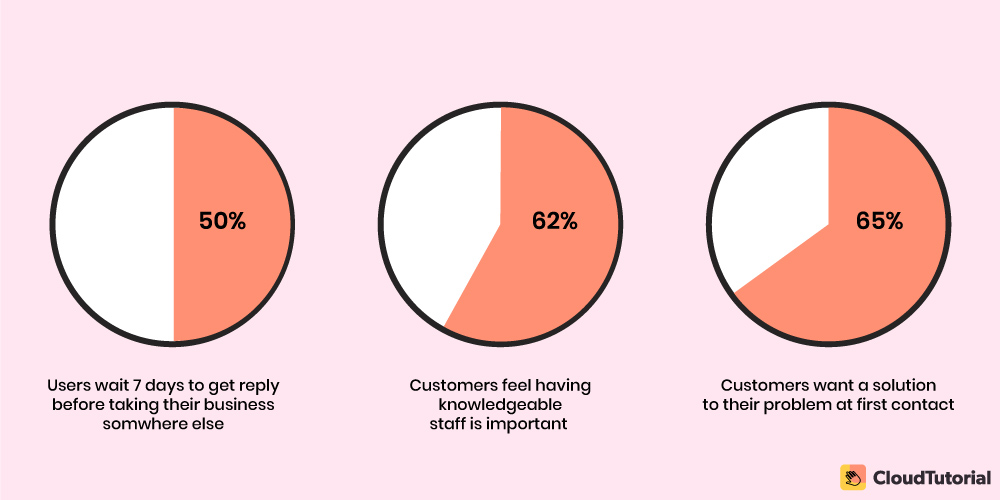As your business escalates, the team of employees requires a space to connect with the information that sanctions them to do their work well. A self service knowledge base is an organized and centralized assembly of information about a service, product, topic, or department.
In certain organizations, it may also be termed as customer support knowledge bases or customer service knowledge bases.
Such information that is easily accessible assists the team to make more informed judgments – marketing can yield more valuable content, customer support can resolve problems faster, and sales can close the deals faster.
In a survey, it is observed that 91% of respondents would utilize an online knowledge base if it were obtainable and customized as per their needs.
Table of Content
The Benefits of Using A Knowledge Base
There are countless benefits of possessing a searchable knowledge base in your company. This includes increasing employee engagement, enhancing productivity, empowering employees to function from any place, averting knowledge loss, overcoming the restrictions of email, and other such communication channels.

Below are the benefits of using knowledge bases where your customers can depend on when they require support:
-
Escalates Customer Retention
When your customers are content, the retention rate surges. This results in consistent sales, higher revenue, and long-term business success. As per Salesforce, customer retention rate (CRR) is crucial to your progression. For instance:
- It is easier to transform a current buyer into a recurrent consumer than to try a lead to convert into a client.
- Faithful consumers are worth 10 times more than a novel procurement.
- If you upsurge CRR by 5%, you can increase your revenues by 25-95%.
These are some of the major advantages that a knowledge base can aid you to attain, by enhancing your customer retention. It is a simple, but competent way of realizing your customers’ anticipations.
-
Enhances Agent Efficiency
A significant hurdle to productivity in the service field is the time it consumes for any support agent to look for answers. Employees devote 20% of their time examining for the information they need in unorganized repositories, the brains of co-workers, and cluttered inboxes, as reported by McKinsey.
A knowledge base integrates all the knowledge present in those areas and makes it searchable and accessible to all employees of the team. In its place, you can emphasize authorizing the agents to function at their best. The ultimate benefit? Your whole company will be on the same level, which will diminish errors and confusion.
-
Deliver Consistent Customer Support
The primary benefit of creating a knowledge base is its 24*7 accessibility. Your consumers can access data when they require it, from any instrument. They do not have to wait to call for support to resolve any problem. If you have global viewers over diverse time zones, you can deliver all your customers with steady help at any time.
Each client in your database obtains high-quality fast service, without having to clarify their issue to the operators. When you present tutorials, how-to guides, infographics, or FAQ pages that lead your customers on utilizing your product, you can offer the buyers all the support they require.
As per SmartInsights’ 2018 search engine data, around half of the internet traffic is via mobile.
With numerous people associated with their phones, retrieving your website in search of responses should be instantaneous and lightweight. A mobile-friendly knowledge base gets you closer to your clients and can even surpass their expectations. Consumers feel respected when they get quick answers and valuable advice.
-
Empowered Remote Staff
Contemporary collaboration does not take place in an office. 70% of specialists worked from home once a week before 2020. Functioning remotely has become common in the rise of the COVID-19 pandemic. A Stanford study showed that by June 2020, 42% of U.S. workforces were functioning from home and that too full-time.
No matter where the teams are employed, they can access the data essential to do their work.
A mobile-friendly and cloud-based knowledge base means that remote staff have access to company knowledge from anyplace. In companies that embrace a flex work prototype, which permits employees to function when and where they are most prolific, a knowledge base authorizes the team to access information the moment they require it.
-
Keeps Your Customers Happy
The most economical manner of mounting your business is by concentrating your exertions on attaining customer success. You must intend to surpass their expectations by building affirmative customer experiences.
A knowledge base presents your customers a chance to solve their matters without your assistance. You get to respond to any queries before they even ask. It is what your customers expect. Today, customers do not like to call for any support. Most of them choose self-service over any human interaction.
Build an advanced knowledge base for your customers and give them answers fast – real fast.
Take your app and help center to the next level with CloudTutorial.
Why Do You Require A Customer Service Knowledge Base?
A self-service online knowledge base is the key to scale-up your start-up and huge enterprises efficiently. It will empower you to keep on serving the customers who require vital information while making proficient usage of your possessions.
It is much easier to concentrate on the attainment of novel customers at the cost of everything else. But at some point in time, consumer retention must become your robust focus. The more consumers we retain, the more consumers we have to assist. You can hire more support agents, but is this approach desirable and sustainable?
Knowledge and speed both play a critical part when it comes to consumer satisfaction. You may need a customer service knowledge base due to the following reasons:
- The chief benefit of a customer service knowledge base is ticket deflection – you require fewer agents to assist the same number of clienteles.
- You will get a few customer questions if the common problems can be resolved with a devoted article.
- Normally, you receive a monotonous type of question. All of which signifies a handful of matters. It is seen that 37–57% of agents spare the majority of their time on repetitive and mundane tasks.
To view evidently how customers respond to their service expedition, let’s observe some of the statistics presented by a recent Harvard Business Review.

One of the greatest methods to convey high-quality and responsive service is to employ a self service customer knowledge base. Most of the service agents have their knowledge base in the form of their notepad file or word document.
Possibly, they have generated while being on the job and learning from users, or with the help of hand-outs produced by service managers.
8 Best Practices And Tips for Creating An Effective Knowledge Base
Now the question is, ‘How would you create an effective knowledge base that cultivates customer attainment?’ The best help content is engaging, informative, mindful, and unquestionably clear of why and how a consumer looked for help.

Forming a knowledge base is a simple procedure if you follow it tactically. By incorporating the below-mentioned knowledge base best practices for your site and content, you can make a huge impact on how your clienteles discover and use data in the time of requirement.
-
Make Composite Knowledge Simple to Understand
The main phase to develop an ingenious knowledge base is simplicity. A knowledge base should be designed in such a way that it is quick to find any answer and easy to use and navigate – just as the self-service customers’ need.
An uncomplicated knowledge base pattern makes easy navigation – just as a self-sufficient customer wants. If you possess a pool of knowledge base content, concise, consistent, and clear topics and categories can be of much assistance.
-
Utilize Phrasing From Tickets
You do not require to reinvent the roll when it comes to forming the content of the knowledge base. You can just copy and paste some of the texts from the recent tickets received, and magnify on this as necessary to seal the holes. Texts from more than a single ticket can be blended to cover dissimilar matters in the same knowledge base editorial.
-
Use A Standard Format
If you are not a writer, it can be tough to contemplate what to pen on each page. Using a standard format to follow for every page can help to speed up the procedure. This also ensures that such pages, written by different individuals are all undeviating in style.
You can use these simple steps to create your pages:
- Step 1: The Issue
Define the problem the consumer is facing. You can also link it to other connected problems so the customers can navigate to the right page quickly.
- Step 2: Action Steps
Describe the step-by-step procedure for evaluating and solving the problem.
- Step 3: The Result
What does the solved problem look like? Narrate the resolution and let the users know that it is the right solution.
You can augment every step with some additional resources like images and video tutorials.
-
Become Analytical
How do the dissimilar pages of the knowledge base function in an organic search? How many clicks do they get? For how much time do individuals stay on that page? Such analysis can assist you in making a knowledge base where you can add supplementary calls-to-action.
This, in turn, can attract anybody coming from organic search to contact your company or sign up for your product.
-
Offer Additional Resources
Some individuals are not readers and the idea of searching through the knowledge base might fill them with anxiety. Nevertheless, they might react well to screenshots or help videos of some common fixes.
Offering additional resources in other layouts can aid enlarge your knowledge base for those individuals who are not able to comprehend the written guidelines. If you place video seminars on spots like YouTube and connect them to your knowledge base, it can serve as online marketing for your company.
-
Answer The Frequently Asked Questions
The main benefit of an online knowledge base is that it slashes down on support questions and the time spent on answering them. Customers can look in the knowledge base to view if their query has been responded to before sending a question.
Shifting elementary support questions to the knowledge base exempts your support staff to answer the trickier questions.
So, together with your support group and articulate a strategy for forming the knowledge base. Generate a master list of the common support questions and state the lessons from the topmost of this list to the bottommost, distributing up the tasks equally and building a program for the updates.
With everybody operating together, you will have an active knowledge base in a short period.
-
Usage of Anchor Links in Prolonged Articles
Sometimes you have to write extensive knowledge base blogs to make sure you are elucidating every stage of the procedure. When it is required to form a long knowledge base article, it aids to comprise the table of contents with anchor links to make sure it is simpler for customers to skip the data that they do not need.
In this way, they can navigate straight away to the particulars they are looking for or a help desk. For the articles of usual length, customers will acknowledge the capability to jump to the section they desire.
-
Enhance The Search Function
Testing and enhancing the search function of a knowledge base is one of the preeminent techniques you can make sure that it stays in constant usage. If the users cannot find any article they require, they can submit a ticket.
So, you must make it easier for them to search for the right information. Along with your associates, draft a ‘tag map’ of the diverse categories and tags in your search. Discover the best method to systematize the data before you begin to tag articles.
You must consider how clienteles describe their problems. You may perhaps call something by its technical term, but will a consumer? Make sure that the title of every page comprises specific keywords and details that could be easily understood by tech-phobic clienteles. Furthermore, the test that the search functions are operating the way you have imagined.
6 Software Solutions to Create A Self Service Knowledge Base
Let’s discover the following software solutions to make a self service knowledge base that permits the customers to find answers to their questions proficiently – the most cost-effective and quickest customer support method:
-
CloudTutorial
CloudTutorial is a knowledge base that aids you to deliver outstanding customer support. It sanctions your customers to search for answers quickly. It facilitates you to form a user-friendly FAQ site and thus, provide rapid solutions to your customers. Such a platform can customize your help center based on your business very efficiently.
This feature-rich knowledge-sharing platform permits you to separate your data by category and sub-category. It lets you create active help content comprising FAQs, articles, procedure documents, and other related data that aid your consumers get prompt answers to their questions.
This platform possesses an easy to use content editor where you can manage and access all the information with just a few clicks. One of the best things about this software that most of the platforms miss is the free version for one team member. Yes, CloudTutorial offers a free version for one team member, so take this benefit.
Build an advanced knowledge base for your customers and give them answers fast – real fast.
Take your app and help center to the next level with CloudTutorial.
-
Document360
Document360 is a dominant knowledge base tool that supplies subscription policies for every taste and budget. It is perhaps the best knowledge base software for huge team-size as it contains the finest option of collaboration characteristics.
Its markdown text editor presents all the essential styling and editing features. Here, you can also add images, links, code samples, videos, call-outs, and tables.
As it delivers two levels of access, you can utilize this software solution for producing both internal and external knowledge bases. Furthermore, it is possible to form manifold knowledge base sites for dissimilar projects. This tool permits you to add members of the team with diverse roles – admin, owner, editor, reader, and draft writer.
-
HelpCrunch
HelpCrunch is a customer service tool that offers knowledge bases functionality, ticketing, live chat, pop-ups, and email marketing. What this software solution has in terms of functionality is a sleek, modern, and simple tool intended to be as opportune as possible.
The customer support representatives will be generating various knowledge base articles in a ‘What You See Is What You Get’ (WYSIWYG) text editor.
HelpCrunch Knowledge base allows you to modify SEO details for each article manually. This assists the search bar engine to understand its content in a better way. You can state the title tag, target keyword, and meta description for all your help articles manually so that they are indexed more efficiently by search bar engines.
-
Zendesk
Zendesk, one of the oldest software solutions, helps you virtually discover the support features in its toolset. When it comes to knowledge management traits, it presents community forums and help-centre functionality. You can generate articles in a great text editor and modify your help-centre with custom themes.
Moreover, there are some valuable features like access control, publishing permissions, and content history, and restoring.
You can present your knowledge base in numerous languages and customers can switch between them very easily. The Zendesk Guide appears like any other type of Knowledge Management system unless you incorporate it with Zendesk Support. It suggests content, based on consumers’ questions and lets you create novel knowledge base articles from the ticket obtained.
-
HelpJuice
HelpJuice’s text editor is rich in characteristics and it seems intuitive and modern. It consists of all the required collaborative features so that several authors can function in an article. There are numerous stages of access that you can establish for your knowledge base – URL-based, internal, public, and for precise customers.
Talking about customization, there are several ready-made templates that you can select from.
HelpJuice presents certain influential knowledge base analytics – performance of articles in all types of graphs and numbers, authors’ activity, and search terms people use. It is indeed perceptive and can aid you to develop constantly.
-
Freshdesk
Freshdesk is a customer service solution presented by Freshworks which embraces call center, live chat, and CRM. The knowledge base trait comprises Freshdesk products. Hence, if you require to use its knowledge base, you must purchase the entire ticketing system.
As a KM software, Freshdesk presents a WYSIWYG editor with all the essential styling and formatting features. You can stipulate meta descriptions and meta titles for your knowledge base article and interpret such articles into dissimilar languages. This software solution offers standard folders and categories for establishing all your knowledge base articles.
Nevertheless, the reports are rather rudimentary as compared to the rest of the knowledge management software. You can examine how many views every article has and whether your customers valued it as unhelpful or helpful.
With a prodigious self-service knowledge base, you can provide your employees with self-service choices. And this same self-service portal will improve response times, save the company’s money, and lessen service desk calls. Contact CloudTutorial and implement a knowledge base to increase collaboration, employee engagement, and productivity of your company.
The above-stated benefits and tips for creating an effective knowledge base have extensive advantages. In this way, your team is empowered to perform their jobs quickly and more efficiently, which will, in turn, benefit your company’s partners and customers.
Try it out before you decide.
Create a test article NOW!
Using this tool, all you have to do is add your first test article and see how it looks. Now, you don’t have to sign-up or login into CloudTutorial software just to check how your first article appears.



